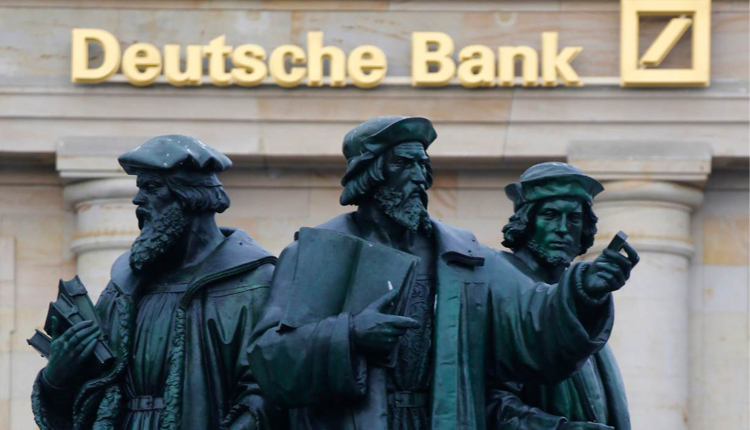German lender Deutsche Bank reported a weaker-than-expected net loss of 3.15 billion euros ($3.51 billion) for the second quarter of 2019.
Analysts polled by research firm Refinitiv had estimated a net loss of 1.7 billion euros for the period, due to the bank’s massive restructuring program announced earlier this month. The German bank itself had previously said it expected to report a net loss of 2.8 billion euros for the quarter.
The embattled German lender saw a net profit of 401 million euros for the same quarter last year, but has since endured a tumbling share price and a fresh round of scandals. Deutsche Bank shares fell more than 5% in early trade Wednesday as investors digested the news.
Here are some of the key highlights for the quarter:
- Net revenue hit 6.2 billion euros, versus 6.59 billion euros a year ago.
- Common equity tier 1 capital ratio of 13.4%, versus 14.7% a year ago
- Substantial strategic transformation charges of 3.4 billion euros.
Earlier this month, Deutsche Bank announced that it would exit its global equities business and slash 18,000 jobs by 2022. First to go were senior executives Garth Ritchie, Sylvie Matherat and Frank Strauss, who will leave the bank at the end of this month.
“We have already taken significant steps to implement our strategy to transform Deutsche Bank,” Christian Sewing, the bank’s CEO said in a statement Wednesday.
“These are reflected in our results. A substantial part of our restructuring costs is already digested in the second quarter. Excluding transformation charges the bank would be profitable and in our more stable businesses revenues were flat or growing.”
Deutsche Bank also revealed that over 900 employees have so far been given notice or told that their roles will be terminated. It further clarified that excluding the strategic transformation charges, net income would have been 231 million euros, versus 401 million euros over the same period last year.
The bank’s shares have fallen more than 30% in the last 12 months, hit by a host of scandals relating to historical anti-money laundering failures. The outlook following the restructure was met with some skepticism by Wall Street analysts, raising questions about whether it was too radical and ambitious.
The bank expects the sweeping reforms, which also involve the creation of a 74 billion euro ($83.05 billion) “bad bank,” to cost 7.4 billion euros by 2022.
Deutsche Bank Chief Financial Officer James von Moltke told CNBC Wednesday that the “more significant share” of the transformation related charges are now behind the bank, adding that feedback from both institutional and corporate clients on the restructuring decisions had been “overwhelmingly positive.”
“The critical point that we took away was the marketplace, whether that’s investors, regulators, rating agencies, and most importantly clients, see the strategic decisions we made as the right ones for the company,” he told CNBC’s Annette Weisbach in Frankfurt. However, he added that the market is expecting to see “proof points” from the bank.
In its earnings report, Deutsche Bank also expressed concerns about global trade tensions and the impact of persistent low interest rates from central banks, with the European Central Bank (ECB) announcing its latest monetary policy decision on Thursday. ECB President Mario Draghi is widely expected to pave the way for a reduction in the bank’s deposit rate or a resumption of quantitative easing (QE).
“If these conditions were to persist for an extended period of time, and not be offset by accommodations such as the tiering of reserves held by banks with the Eurosystem central banks, this could result in a significant impact on revenues relative to our current expectations,” the Deutsche Bank earnings report stated.
“Actions to offset this rate impact, such as pricing changes or the introduction of fees, may not be sufficient to offset this impact.”
Source: CNBC
